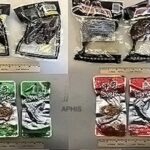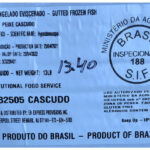APHIS seized prohibited pork sourced from China, along with poultry and ruminant products from New York City retailers in the last three months of 2021, according to a press release from the USDA. APHIS is the Animal and Plant Protection Service branch of that agency. More than 1900 pounds of prohibited products were seized. The foods were sourced from China and didn't have the required import permits and health certificates, and are considered a risk of introducing invasive plant and animal pests and diseases into the country. The prohibited pork from China and other meats were destroyed. These efforts are part of a collaboration between APHIS, the USDA Food Safety and Inspection Service (FSIS), U.S. Customers and Border Protection, and New York City public health … [Read more...]
Consumer Advisory Issued For Bushmeat in Minnesota
A consumer advisory for bushmeat has been issued by the Minnesota Department of Agriculture (MDA). This illegal product was confiscated in December 2021 at the Minneapolis-St. Paul International Airport. There have been "multiple instances" of bushmeat being smuggled into Minnesota from Liberia, according to the notice. Those products were seized and destroyed. Bushmeat is raw or minimally processed meat that comes from wild animals, usually monkeys and other nonhuman primates, cane rats (grasscutters), duiker antelope, and bats. These products carry a risk of human infection from different pathogens, including the Ebola virus. Ebola is spread through direct contact with the blood or body fluids of a person who is sick with the virus or who has died from it. The virus is usually … [Read more...]
Siluriformes Imported From Brazil Triggers Public Health Alert
The USDA has issued a public health alert for siluriformes imported from Brazil because that country is ineligible to export these fish to the United States. A recall was not recommended for these catfish because the government believes that the item is no longer available for sale in stores for purchase by consumers. The frozen whole siluriformes products were produced on April 23, 2021. EB Express Provisions Inc. is the importer of record. That firm is located in Newark, New Jersey. The recalled item is 13 to 14 pound cases of "Gutted Frozen Fish Scientific Name: Hypostomus." The production date printed on the label is 23/04/21. The whole frozen fish were removed from the cases and sold individually, by weight, in plastic bags at Mass. Mineirao Markets. The fish is identified … [Read more...]
Mexican Papayas Still on Import Alert For Salmonella Contamination
Mexican papayas are still on the FDA Import Alert list for possible Salmonella contamination, after a 2017 outbreak that sickened at least 251 people across the country with nine strains of the pathogen, including Thompson, Kiambu, Anatum, Agona, Gaminara, Urbana, Newport, Infantis, and Senftenberg. That outbreak began in March 2017 and ran through October 2017. Another Salmonella outbreak, that time Salmonella Agona, linked to Mexican papayas sickened more than 100 people in many states. Mexico produces 11% of the world's production of papayas, but about 65% of all of the papayas imported into the U.S. are from Mexico. The fruit is imported from the Mexican states of Jalisco, Colima, Chiapas, and Veracruz. The FDA document state that "Evidence shows there is widespread … [Read more...]
Vibrio Outbreak Linked to Fresh Crab Meat From Venezuela Ends; Lawsuits Possible
The Vibrio outbreak that was linked to fresh crab meat imported from Venezuela has ended, according to the FDA. As of September 27, 2018 26 lab-confirmed cases in seven states and the District of Columbia were reported in people who ate this product. Nine people were hospitalized. Illness onset dates ranged from April 1, 2018 to July 19, 2018. The FDA's Bacterial Analytical Manual states that "“A heat-processed product should not contain viable V. parahaemolyticus and if so, would indicate a significant problem in manufacturing practices or post-process contamination." The notice states that "Consumers and restaurants may want to consider using pasteurized crab meat or fully recooking (bringing to an internal temperature of at least 165°F) fresh crab meat, particularly for … [Read more...]
Congresswoman Questions USDA Equivalency of China’s Poultry Processing Plants
Congresswoman Rosa DeLauro (D-CT) recently wrote a letter to Agriculture Secretary Sonny Perdue, questioning the USDA's process approving China's poultry processing plants. These plants are now able to export processed chicken to the United States. She expresses concern about the way the USDA has approved those plants. Her letter states that she opposed the equivalency designation because "it irresponsibly granted equivalency to the entire country's poultry processing system despite FSIS having only audited a limited number of China's poultry processing plants." She also states that the recent release of internal emails shows that "FSIS is taking a stunningly passive approach in approving three new Chinese poultry processing as eligible to export to the United States." The … [Read more...]
Food & Watch Watch Wants USDA to Halt Chinese Chicken
In late June, the first shipment of processed chicken from China arrived in the U.S. Wenonah Hauter, executive director of Food & Water Watch, issued a statement about this event. In 2014, China completed the paperwork to certify four of its poultry processing plants so they can export these items to the U.S. The raw poultry must come from "approved sources," but food safety advocates are not convinced. The USDA has not disclosed where the raw poultry comes from. And the chicken will not be labeled, so consumers won't know if they are buying products from China. Food safety problems in China have been rampant. A scandal where companies added melamine to milk to hide dilution sickened more than 300,000 babies. Jerky pet treats imported from China have sickened and killed … [Read more...]
USDA Institutes 100% Testing of Brazilian Beef Imports
The USDA announced this week that they have instituted additional pathogen testing of all shipments of raw beef and ready-to-eat products from Brazil after a scandal erupted in that country. It is alleged that beef company officials paid bribes to Brazilian government inspectors to ignore adulterated meat that was put into commerce. Company officials are accused of influencing the government to assign these inspectors to their plants. Health certificates were also allegedly falsified. Brazil is one of the countries that has inspection equivalency from the USDA, which means the U.S. considers their beef inspection programs equivalent to ours. The press release states that "none of the slaughter or processing facilities implicated in the Brazilian scandal have shipped meat products … [Read more...]
Outbreaks Linked to Imported Foods Are Increasing
A study published in the March edition of the CDC's Emerging Infectious Diseases reveals that more Americans are being sickened by imported food. The study's authors state that "a small but increasing number of foodborne disease outbreaks [are] associated with imported foods, most commonly fish and produce. New outbreak investigation tools and federal regulatory authority are key to maintaining food safety." About 19% of the food we eat in this country is imported. About 97% of the fish and shellfish we consume, 50% of fresh fruits, and 20% of fresh vegetables come from other countries. This proportion has steadily increased over the past 20 years because consumers want to eat produce out of season and want a wider selection of products. A food poisoning outbreak is two or more … [Read more...]
FDA Bans Certain Egyptian Frozen Strawberries for Hepatitis A
The hepatitis A outbreak linked to Tropical Smoothie Cafe products that were made with frozen strawberries has sickened at least 134 people, according to the FDA. Those berries were allegedly imported from Egypt, according to government officials. Now the FDA has issued an import alert banning frozen strawberries from one Egyptian facility, although a portion of the alert with details about the ban is redacted. The only portion in the "notes" field on the alert that isn't blacked out is the phrase "Problem(s): Hepatitis A (1b)." The facility is the International Company for Agricultural Production & Processing. The "1b" denotes the strain of hepatitis A. A notice posted on the Virginia Department of Health website in August 2016 states that testing on the patients has confirmed … [Read more...]














